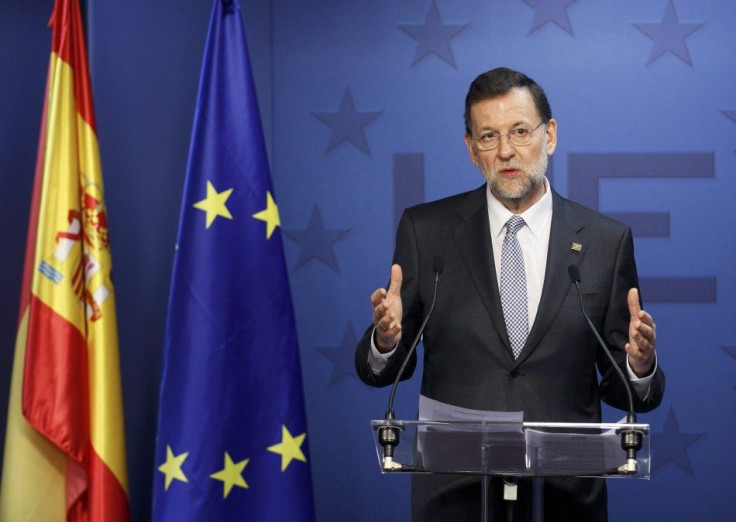Spain Defies Brussels on Deficit Objective

(Reuters) - Spain defied the European Union on Friday, setting a 2012 deficit target at 5.8 percent of gross domestic product, a far softer goal than the 4.4 percent agreed with Brussels.
Prime Minister Mariano Rajoy said Spain was working within EU guidelines because it would still cut its public deficit to 3 percent of GDP by 2013. He said the new 2012 target was still a tough one.
I'm backing austerity and aim to reduce the deficit from 8.5 percent to 5.8 percent; that's significant austerity, he said at the end of an EU summit in Brussels.
The announcement cast a pall over an agreement for tougher debt rules in the bloc. All but two of the EU's 27 leaders signed up to a 'fiscal compact' on Friday that commits euro zone countries to balancing their budgets over the medium-term.
That could strengthen the view that now is not the time to ease the rules for Spain despite its lobbying for leeway.
Rajoy said the move would not spook markets, but European stocks dipped and German Bundfutures hit a session high after he spoke.
Spain's government will announce later on Friday its spending plan for Spain's public administrations in 2012, including for the 17 autonomous regions. The plan will add to cuts worth around 15 billion euros ($20 billion) announced in December.
Spain is emerging as a test case of whether Europe is willing to ease fiscal rules that heap more cuts on member states grappling with stunted growth, high unemployment and the threat of growing social unrest.
Some at the European Commission have voiced concern over any leeway on the deficit, fearing financial markets would lose faith in the future of the euro zone.
Rajoy said he did not bother lobbying other European leaders at Friday's summit.
I'm not going to tell the other presidents or heads of state about the deficit figure that will be included in our budget. I don't have to. It's a sovereign decision. I'll tell the (European) Commission in April, Rajoy said.
Rajoy campaigned on strict adherence to the 4.4 percent target, but Spain's economic situation has deteriorated since he took office in December.
OVERSPENDING IN 2011
Spain's finance minister said this week the deficit for 2011 was 8.5 percent of gross domestic product, 2.5 percentage points higher than was envisaged.
As a result, it would have to cut some 44 billion euros to reduce the deficit to meet the 4.4 percent target, which would plunge the country deeper into recession.
A 5.8 percent target implies cuts of about 30 billion euros.
It's still a difficult objective in the absence of any traction in external demand. Spain is going to depend a lot on the economic tone of its main commercial partners in the euro zone, said Emilio Ontiveros, economist at Analistas Financieros Internacionales in Madrid.
European Commissioner for Economic and Monetary Affairs Olli Rehn has insisted Spain provide more details of why its deficit for 2011 overshot by such a wide margin.
Sources have told Reuters that some at the European Commission suspect Madrid inflated its deficit forecasts for 2011 to help it gain flexibility for its target this year. The Spanish government has vigorously defended its figure.
Credit ratings agency Fitch backed Spain's push for a more lenient deficit objective for this year, while still aiming to hit the 3 percent target set for 2013. The agency said it would not hurt the country's ratings to have a realistic target.
The European Commission forecasts Spain's economy would contract by 1 percent this year. The International Monetary Fund and Bank of Spain expect it to fall around 1.5 percent.
Bleak jobless figures showed on Friday the pressure Spain's economy is under as it struggles to restart growth while fighting the highest unemployment rate of developed countries.
Spain's jobless rate rose by 2.4 percent in February from a month earlier, leaving 4.7 million people out of work. Spain accounts for nearly one third of all those without work in the European Union.
The prospect is even worse for people under 25, with one in two Spanish youths unemployed - a key concern for Spaniards, many of whom have taken to the streets to protest cuts in education and health.
($1 = 0.7501 euros)
--
© Copyright Thomson Reuters 2024. All rights reserved.





















